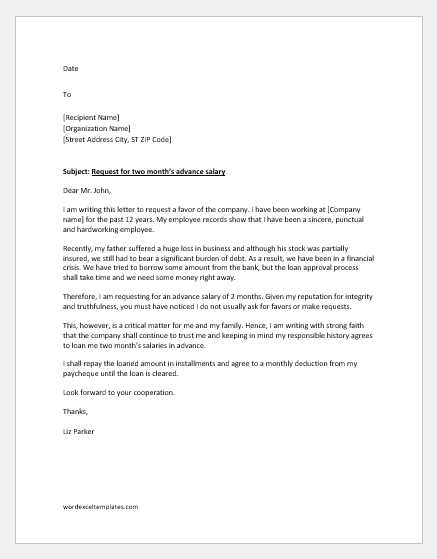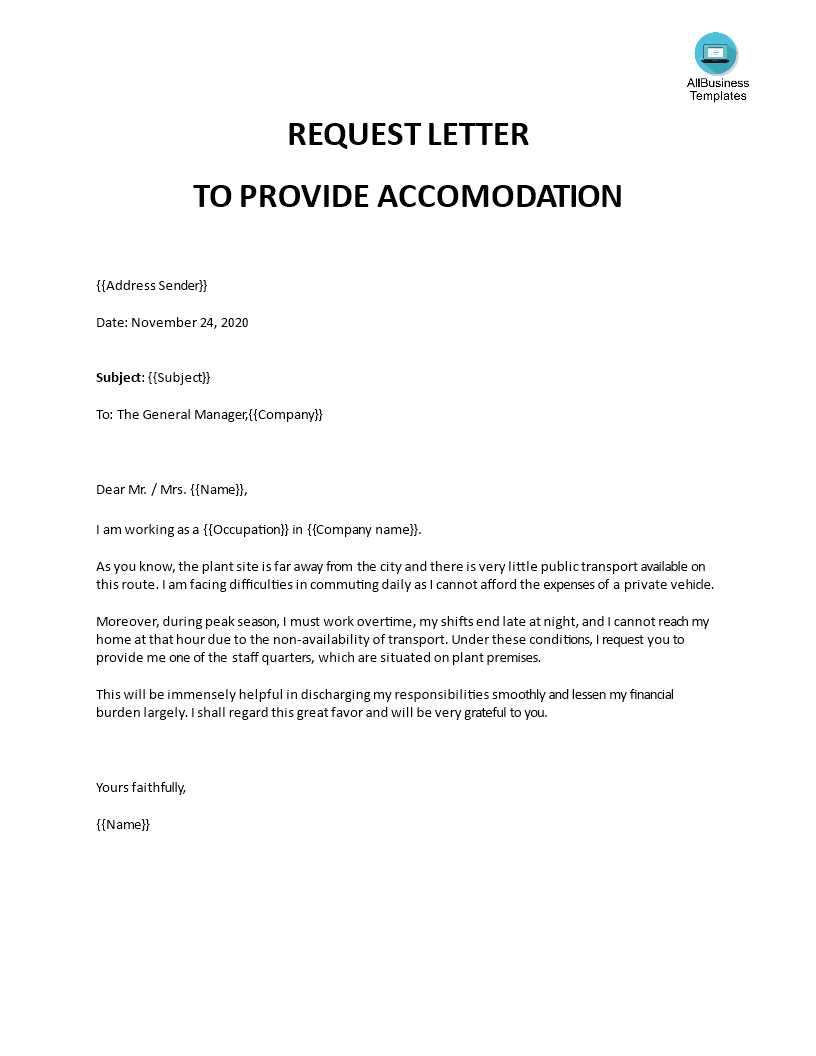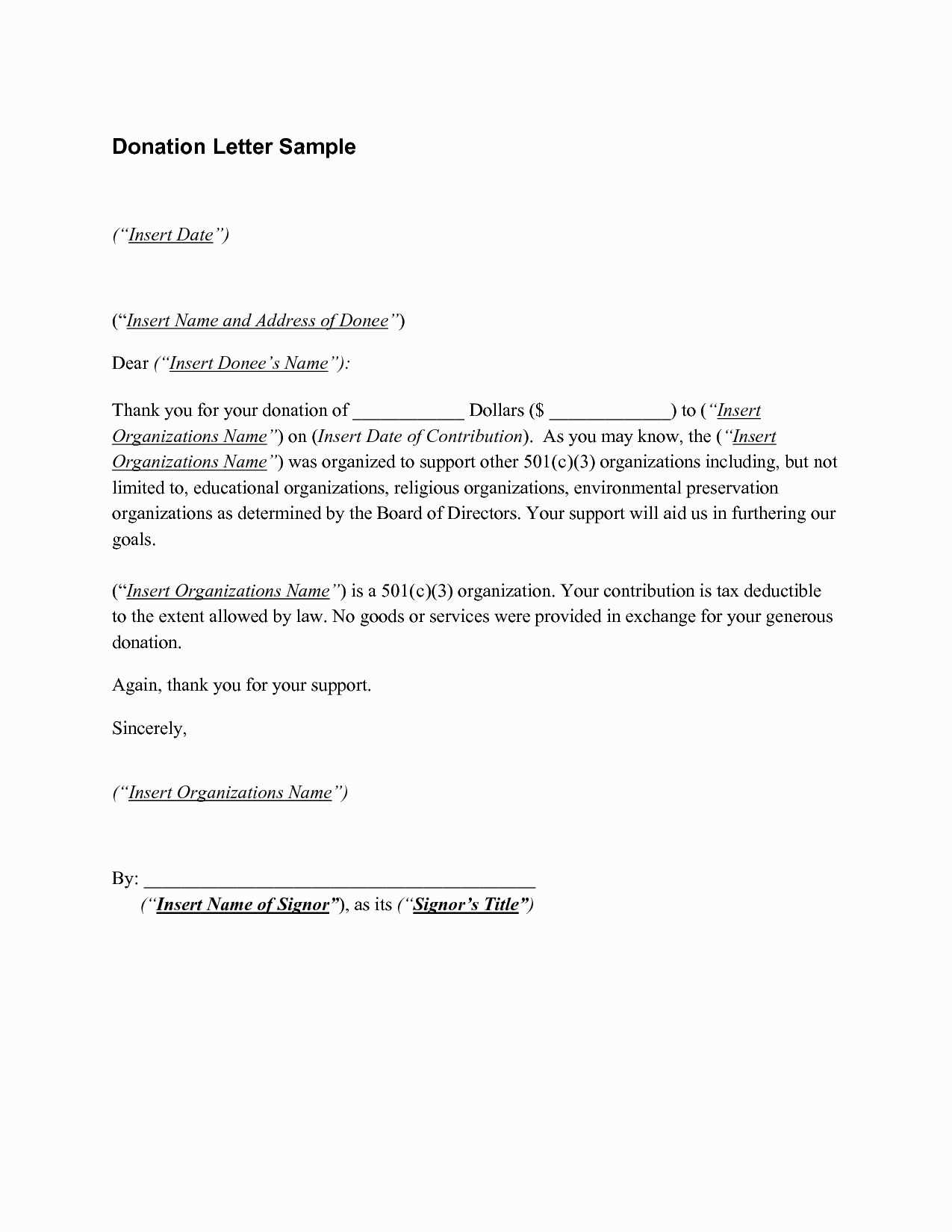Religious accommodation letter template

When requesting a religious accommodation at work or school, a well-structured letter can help ensure a smooth and clear communication process. Start by addressing the letter to the appropriate individual, such as your supervisor, HR manager, or school administrator. Clearly explain your request, including specific religious practices or beliefs that require accommodation, and outline the adjustments needed to respect your beliefs.
Be specific and concise when detailing the accommodation. Whether it involves changes to work hours, the ability to wear religious attire, or time off for religious observances, provide as much information as necessary to make the request understandable. Include any relevant dates or timeframes and mention any potential impact the accommodation might have on your duties or responsibilities.
It’s also helpful to reference any company policies or legal guidelines that support your right to request a religious accommodation. This can provide additional context and reinforce the legitimacy of your request. Finish the letter by expressing your willingness to discuss the request further or provide additional documentation if necessary.
Here are the revised lines:
Include the specific religious accommodation request in clear terms, such as: “I am requesting a reasonable accommodation for my religious practices. I observe [insert religious practice], which may require [insert specific accommodation].”
Clearly state the desired accommodation, like: “I would like to request [insert accommodation], which would allow me to continue practicing my faith while fulfilling my work obligations.”
Provide any supporting documentation, such as a letter from a religious leader or organization, if necessary: “I have attached a letter from [insert religious leader or organization] that verifies the religious practice I am requesting accommodation for.”
Explain how the accommodation will not interfere with job performance: “I believe this accommodation will not interfere with my job responsibilities. I am committed to ensuring that my work performance remains unaffected.”
Offer alternative solutions if applicable: “If the requested accommodation is not feasible, I am open to discussing alternative ways to meet both my religious needs and the job requirements.”
Always remain respectful and professional in your tone and communication. Avoid making demands or sounding confrontational. Keep the letter focused on your needs and willingness to collaborate.
- Religious Accommodation Letter Template
To request religious accommodation in a workplace or educational setting, you should clearly state the purpose of your request and provide details on how your religious practices require specific adjustments. Use a formal, respectful tone and be specific about your needs. Here is a practical template:
Subject: Request for Religious Accommodation
Dear [Recipient’s Name],
I hope this message finds you well. I am writing to formally request a religious accommodation in accordance with [company’s or school’s] policies. As part of my religious beliefs and practices, I am requesting [specific accommodation needed, e.g., prayer time, dietary considerations, dress code modifications, etc.].
This accommodation is important to me because [briefly explain why this accommodation is necessary for your religious practices]. I am open to discussing possible solutions that would meet both my religious needs and the requirements of the [workplace or educational institution].
Please let me know if you require any additional information or documentation to support my request. I appreciate your consideration and look forward to your response.
Thank you for your time and understanding.
Sincerely,
[Your Name]
[Your Position or Student Status]
Religious accommodation addresses the specific needs of individuals in the workplace or educational settings, ensuring their religious practices do not conflict with their professional or academic responsibilities. By making reasonable adjustments, employers and institutions can uphold both legal requirements and ethical standards of inclusivity and respect.
Legal Framework for Religious Accommodation
In many regions, religious accommodation is a legal requirement under anti-discrimination laws. Employers must make reasonable efforts to adjust work schedules, dress codes, and duties, unless it poses undue hardship. Understanding these legal obligations is the first step toward fostering a respectful environment where individuals can practice their faith without fear of discrimination.
How to Address Religious Accommodation Requests
When an employee or student requests accommodation, it is important to have a clear process for evaluating and responding. This includes understanding the nature of the request, considering the feasibility of adjustments, and maintaining open communication to find a balance that meets both the individual’s needs and organizational requirements. Flexibility and cooperation are key in these situations.
| Religious Practice | Possible Accommodation | Potential Challenges |
|---|---|---|
| Prayer Times | Flexible break times | Impact on team scheduling |
| Religious Dress | Allowing religious attire in the workplace | Dress code compliance concerns |
| Fasting | Adjusted meal break times | Impact on physical performance |
When submitting a religious accommodation request, it’s crucial to be clear and specific. Your request should be well-structured to help the recipient understand your needs. Below are the key elements that make up a complete and effective request.
1. Statement of the Religious Belief or Practice
Begin by describing the religious practice or belief that requires accommodation. Include details such as the specific ritual, observance, or requirement and why it’s important to you. This helps provide context and makes the request more personal.
2. Clear Description of the Request
Specify exactly what type of accommodation you’re seeking. Whether it’s time off for religious holidays, flexible scheduling for prayer, or changes to the dress code, the request should be clear and precise. Avoid vague statements and include any relevant dates, locations, or times.
3. Reason for the Request
Explain why the accommodation is necessary for the observance of your religious practice. This allows the recipient to better understand the connection between your belief and the accommodation requested.
4. Willingness to Discuss Alternatives
Show openness to finding a mutually acceptable solution. Indicate that you’re willing to discuss options or work together to find an arrangement that meets both your needs and the organization’s requirements.
5. Supporting Documentation (If Applicable)
If necessary, attach or offer to provide supporting documentation such as religious texts, letters from religious leaders, or other evidence that validates your request. This can strengthen your case and offer additional clarity.
6. Contact Information
Ensure you include your contact information so that the recipient can reach you easily if they need further details or clarification.
- Religious belief or practice description
- Clear and specific accommodation request
- Explanation of the need for the request
- Openness to alternative solutions
- Supporting documentation (if applicable)
- Contact information
Provide clear guidelines on religious practices that may require accommodation. For instance, ensure access to designated prayer spaces, allow flexible break times for religious observances, or adjust work schedules to accommodate holidays. Be transparent about available resources, such as religious materials or attire allowances, and consider providing private areas for rituals that require privacy.
Offer alternative arrangements for dietary restrictions by collaborating with food services to provide halal, kosher, or vegetarian options. It’s important to maintain flexibility in meeting dress code standards, accommodating religious clothing and head coverings where appropriate.
In situations where requests conflict with work requirements, engage in open dialogue with the individual to explore solutions that respect both the needs of the employee and the organization. Collaborate and find a reasonable compromise that honors their religious practices without disrupting the workplace.
Employees seeking religious accommodations have specific legal rights under both federal and state laws. Employers must evaluate each request on a case-by-case basis, considering both the employee’s religious practices and the company’s operational requirements. The key law governing such requests is Title VII of the Civil Rights Act of 1964, which mandates that employers provide reasonable accommodations unless it imposes an undue hardship on the business.
Understanding Undue Hardship

Undue hardship refers to a significant difficulty or expense for the employer. This may include factors like significant cost, disruption to the workflow, or a threat to workplace safety. However, employers must demonstrate that accommodating the request would indeed cause undue hardship; they cannot refuse based on assumptions or generalizations.
Documenting Requests and Responses
It’s crucial to document both the employee’s request for accommodation and the employer’s response. Clear communication helps prevent misunderstandings and ensures that both parties comply with legal requirements. Employers should explain the reasons for granting or denying a request in writing, outlining any alternative accommodations offered.
Clearly articulate your request. Avoid being vague or general about the accommodation you seek. Specify the religious observance, its frequency, and how it may impact work or other obligations.
1. Incomplete or Inaccurate Details

- Ensure your request includes all relevant information about your religious needs. This includes times, dates, and any special considerations.
- Provide clear and accurate documentation or references to religious practices if required.
2. Not Considering the Employer’s Needs
- Recognize that your request may affect the organization. Offer solutions or compromises that balance both your religious needs and the business’s operational needs.
- Be open to discussing how your request can be accommodated without disrupting workflow or productivity.
3. Failing to Show Flexibility
- While your needs are valid, flexibility goes a long way. Consider different ways your request can be fulfilled to ensure minimal disruption.
- Be willing to discuss adjustments, like altering break times or rearranging schedules.
After submitting your accommodation request, it’s important to follow up to ensure your needs are addressed. Here’s how to do it effectively:
1. Wait for an Appropriate Amount of Time
Allow a reasonable period (usually 7-10 business days) for your request to be processed. This gives the recipient enough time to review and respond.
2. Send a Polite and Professional Follow-Up Email
If you haven’t received a response, send a courteous follow-up email. Include your original request date, a brief mention of your needs, and express your willingness to provide any additional information if needed.
- Start with a polite greeting and mention the date of your initial request.
- Clearly state that you are following up and inquire about the status of your request.
- Offer to provide any further details if necessary.
- End with a polite closing and thank them for their attention to the matter.
3. Contact the Right Person
If you don’t receive a response from your initial contact, reach out to someone higher in the organization or a designated point of contact for accommodations.
4. Document Your Communication
Keep a record of all communications for future reference. This will help if further follow-ups are required or if any issues arise.
5. Be Patient and Persistent
If you still haven’t heard back after a follow-up, remain professional and persistent. A gentle reminder is often all that’s needed to keep the process moving.
In these versions, unnecessary repetition is avoided while retaining the meaning of each sentence.
Start by focusing on the key points and presenting them directly. Avoid restating ideas with different phrasing unless it adds clarification. Each sentence should introduce new information without reiterating what was already said. For instance, instead of saying “I request that you consider my religious needs, and I ask that you accommodate them,” use “I request accommodation for my religious practices.” This conveys the same request clearly without redundancy.
Examples of Clear and Concise Sentences
| Original Sentence | Revised Version |
|---|---|
| I am writing to formally request a religious accommodation for my needs. | I request accommodation for my religious needs. |
| Please allow me to take time off on religious holidays, as they are important to me. | I request time off on religious holidays. |
| I am requesting an adjustment to my work schedule for religious reasons, as I have specific practices that need to be observed. | I request a work schedule adjustment for religious observance. |
Maintaining Clarity While Reducing Redundancy
When creating accommodation letters, aim for clarity. Focus on providing only the necessary details that support the request. Use specific terms that avoid repeating similar concepts across different parts of the letter. This helps keep the content direct and to the point, without leaving out important information.